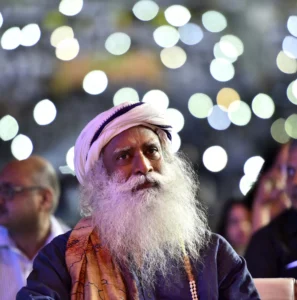“Sadhguru’s Isha Foundation Secures Stay from Supreme Court on Police Investigation”

The Supreme Court of India has recently intervened in a significant legal matter involving Sadhguru Jaggi Vasudev, the founder of the Isha Foundation. This intervention comes as the apex court has paused a previous order from the Karnataka High Court that had directed police to investigate allegations against Sadhguru related to land encroachment and environmental violations.
Background of the Case
The controversy began when a public interest litigation (PIL) was filed, accusing Sadhguru and his organization of illegally occupying land and violating environmental regulations in the construction of an ashram in Tamil Nadu. The Karnataka High Court had ordered a police probe into these allegations, which prompted Sadhguru to challenge the order in the Supreme Court.
Supreme Court’s Ruling
In a recent hearing, the Supreme Court granted interim relief to Sadhguru by putting a hold on the High Court’s directive. The bench, led by Justice Sanjay Kishan Kaul, emphasized that the matter requires careful consideration and that the allegations must be thoroughly examined before any investigative steps are taken against him. The court has scheduled further hearings to delve deeper into the specifics of the case.
Reactions and Implications
Sadhguru’s supporters have hailed this decision as a victory for justice, asserting that the allegations are baseless and part of a larger agenda to undermine his work in promoting spirituality and environmental awareness. Conversely, environmental activists have expressed concerns about the implications of this ruling, fearing it may set a precedent that allows influential figures to evade accountability for environmental violations.
What are the key points from the Supreme Court’s decision regarding Sadhguru
Suspension of Police Action
- The Supreme Court stayed the Madras High Court’s order that directed the Tamil Nadu Police to investigate allegations against the Isha Foundation, including claims of illegal confinement and brainwashing related to two women residing at the ashram
Transfer of Case
- The Supreme Court transferred the habeas corpus petition concerning the alleged forced detention of the two women from the Madras High Court to itself, indicating that it would handle the matter directly
Direct Engagement with Petitioners
- The Chief Justice of India (CJI) conducted private video conferencing with the two women involved, who asserted that they were at the ashram voluntarily and faced harassment from their father for several years
Concerns Over Religious Freedom
- The Supreme Court emphasized that issues of religious freedom are critical in this case, stating that inquiries should not be initiated based solely on oral assertions without substantial evidence
Critique of High Court’s Approach
- Solicitor General Tushar Mehta criticized the Madras High Court for its handling of the case, suggesting it should have approached the matter with more caution
Status Report Requirement
- The court instructed the Tamil Nadu Police to submit a status report on all criminal cases involving the Isha Foundation directly to it, rather than proceeding with investigations as previously directed by the High Court
Future Hearings
- The Supreme Court has scheduled further hearings on this matter for October 18, where it will continue to assess the situation and review findings related to the allegations against the Isha Foundation
This ruling highlights ongoing tensions between spiritual organizations and regulatory scrutiny in India, particularly concerning individual freedoms and institutional practices.
What was the reasoning behind the Supreme Court’s decision to pause the High Court’s order
1. Voluntary Statement by the Women
The Supreme Court noted that the two women involved in the habeas corpus petition had voluntarily stated they were residing at the Isha Yoga Centre of their own free will. This assertion was significant because it indicated that the basis for the High Court’s inquiry—allegations of coercion—was undermined by their own testimony, which suggested that there was no immediate need for police intervention
2. Concerns Over Police Presence
During the proceedings, Chief Justice D.Y. Chandrachud expressed concerns about the presence of a large police contingent (approximately 150 officers) at the ashram, stating, “You cannot let an army or police into an establishment like this.” This remark highlighted the court’s apprehension regarding the potential disruption and intimidation that such a police presence could cause to individuals within the ashram
3. Judicial Caution on Investigative Interference
The Supreme Court emphasized that high courts should exercise caution when issuing orders that interfere with ongoing investigations. It reiterated principles from previous rulings, stating that judicial interference in investigations should be rare and only occur in exceptional circumstances where it is clear that no cognizable offense exists. The court underscored that allowing such interference could hinder the investigative process and compromise evidence gathering
4. Transfer of Jurisdiction
The Supreme Court took over the case by transferring the habeas corpus petition from the Madras High Court to itself, indicating its intention to directly oversee any further proceedings related to this matter. This move suggests a desire for a more centralized and careful examination of the issues at hand
5. Future Hearings Scheduled
The Supreme Court has scheduled further hearings for October 18, indicating its commitment to thoroughly review all aspects of the case before allowing any investigative actions to proceed
.These points reflect a broader judicial philosophy aimed at protecting individual rights while ensuring that law enforcement operates within appropriate boundaries, particularly in sensitive cases involving spiritual organizations and personal freedoms.